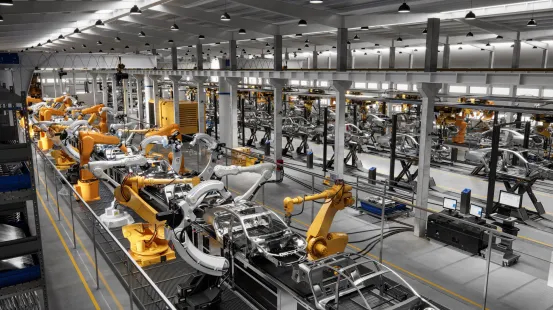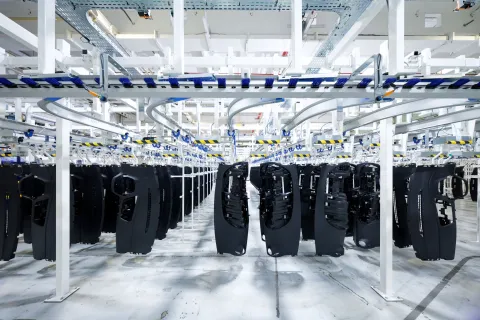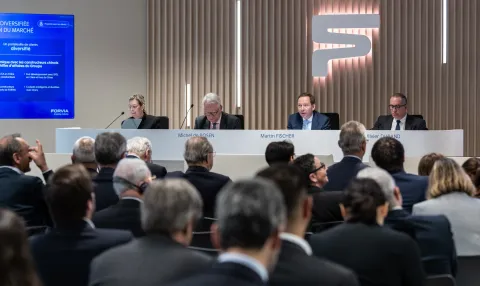
What is currently happening in the automotive industry?

The cars we must now build are very different from those we have been producing for decades
This shift is a direct consequence of climate change and the ensuing imperative to decarbonize mobility. Decarbonation primarily means electrification of the powertrains, no matter if it is through batteries or hydrogen, as long as the energy powering the system is truly green. This path is the right one for climate, but it goes extremely fast for those in operations – in 2019 (before COVID), more than 90% of produced cars worldwide were still based on internal combustion engines, it should be around 30% by 2030. Such a change, at this speed, after decades of research and development in ICE is a huge transformation to digest for our industry's manufacturing landscape.
Moreover, vehicle decarbonation isn't just about electric engines. It is also about a complete reimagining of how we design cars: making them lighter, more energy efficient and less CO2 intensive. This entails, first, thinking of new architectures with frugality and modularity as core principles, second, significantly increasing the proportion of bio-sourced or recycled materials used in our cars. It calls for new skills, specialties, and processing methods in our historic activities—exactly what we are doing with MATERI’ACT, developing formulations for new materials that can save up to 85% CO2 vs their current standards. Here again, this is a completely new industrial process to implement.
The rise of electric vehicles also underscores the increasing importance of electronics as our vehicles are evolving into computers on wheels. At FORVIA, we assess that electronics will weigh for about 35% of the value of an EV car in 2030 against just 15% today. Software will be everywhere, for energy management, for comfort, for connected services and for safety. It will become so prominent that it will require a completely different mindset, transitioning from a mechanical engineer-dominated age to one led by tech-savvy and software professionals: a complete transformation in our R&D priorities and skills to develop.
Europe needs to wake up!
The foremost consequence of these product changes is a profound redistribution of forces, where previously dominant regions (like Europe or North America) are now completely outpaced by Asia, particularly in traditional car production.
This shift from West to East is clear: in 2030, about 58% of all cars produced in the world should be in Asia (representing about 55M vehicles, +17% vs today) while in Europe for instance, we should see a production stabilized around 17M vehicles with no growth expected. China is the symbol of this shift as they are now n°1 in car exportations while they were only n°9 in 2020! They take full advantages of the worldwide demand for electric cars, and they have structural advantages to produce more affordable EVs: direct access to critical resources, cheaper energy cost by 40% vs EU, massive subsidies to their local companies and some leaders in electronics that are decisive for the reasons explained above. They also have a domestic demand we no longer have in Europe – in China, the equipment rate per people is still about 2 to 3 times less important than in EU or US today.
All these interconnected factors make vehicles’ production costs significantly more competitive in Asia than in EU (from 10% to 30% cheaper in EV) and have enabled numerous new brands to enter the market with more affordable products. New players with no legacy on their past industrial activities and extremely competitive for a simple reason that it is far easier for an electronic brand to integrate mechanical skills in its chain of production than traditional mechanic players mastering electronics. Because these changes are so fast, it becomes clear that our industry must adapt its European industrial setup to remain competitive. The status quo is not an option, it will just lead to massive loss of market shares in this though competition.
We must reconnect to what truly matter to people
In the midst of these structural changes and because of unnecessary debates about electric mobility and political uncertainties, we are losing the consumers. We cannot succeed in decarbonating mobility if we don’t truly embark people in this transformation and unfortunately today it is still perceived as a constraint by end-users. Collectively (the whole automotive industry and the authorities) we must reconnect to consumers and give them affordable and fair solutions tailored to their true needs, (electric) mobility solutions that matter to them.
Not everyone is looking for a car full of electronics widgets or with huge speed, most of the people want safe, reliable and comfortable cars and they are ready to switch to electric vehicles if they know that the product is close to their today’s mobility habits, if the price is right (affordability), if the full ecosystem is there (charging points, dealers for maintenance) and if they are convinced that the technology will be supported for long (no change in political decisions).
We need to come back to the fundamentals of our industry: create attractive products adapted to each need at the right price.
In that sense, European public authorities must be clear and act at all levels: strong financial aids to end-users who really need them, clear decisions for the benefits of our industry (including batteries) to make us as competitive as our Asian counterparts and massive investments to develop the required ecosystem, especially charging points.
FORVIA is ready to compete!
In this fast-changing environment, it’s urgent to take the necessary measures to emerge as winners. And we have some key levers to activate in order to get the best out of the game!
It starts with reinforcing our competitiveness in Europe. And we cannot rest! Especially when you consider that other transformations are rapidly impacting the industry, such as GenAI that will be soon present everywhere in our work. At FORVIA, we face the important task of guiding our teams through this revolution.
Then, FORVIA can clearly benefit from the Asian growth. We already work with 19 out of the top 20 Chinese OEMs, have very strong connections with them to develop the products they need, and we are reinforcing our industrial footprint in this area (our Fengcheng plant inaugurated last year is a symbol of our industrial vision – high tech and carbon neutral). We need to pursue in that direction.
Finally, we know how to adapt by transforming ourselves. These transformations require us to be much more selective in our programs and to be clear on what business we want to give priority to. In a very fragmented market with so many divergent OEM strategies, we cannot afford to indiscriminately follow others with so many different technological, global footprints, or product strategies, especially in a period with so many political uncertainties.
We will reinforce our market intelligence to be even more connected to consumers, to build distinctive products and to bet on the most successful programs. We have the teams, the skills and the tools to succeed with agility, selectiveness, and strong convictions. FORVIA will drive with vision.



